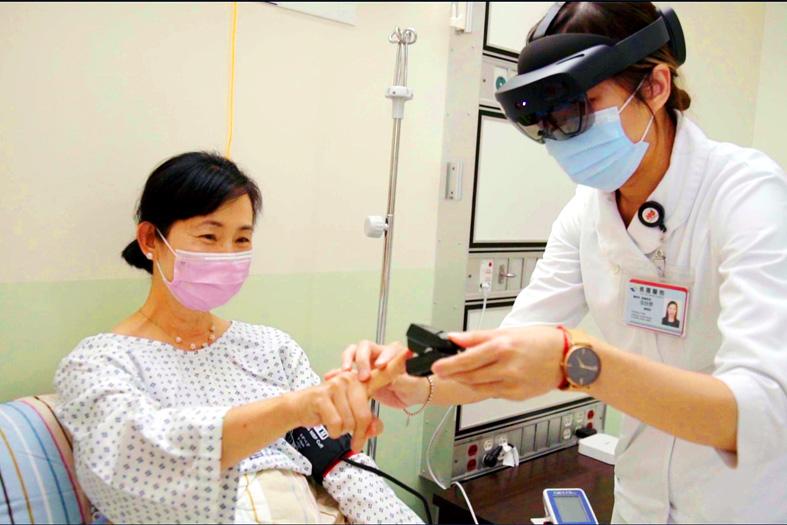National Taiwan University Hospital (NTUH), the Taoyuan City Government and local technology companies on Thursday unveiled a blood oxygen monitor platform and mixed reality headsets to help medical workers combat silent hypoxia in COVID-19 patients.
The equipment was developed to facilitate “zero contact” treatment methods and reduce hypoxia deaths, they said.
The program’s partners include the Industrial Technology Research Institute and Microsoft Taiwan, among others, they said, adding that the equipment would be deployed in six municipal quarantine facilities.

Photo courtesy of National Taiwan University Hospital
One-third of COVID-19 patients with mild or moderate symptoms might experience rapidly deteriorating health conditions in late stages of the disease, said Lee Chien-chang (李建璋), deputy director of NTUH’s Center of Intelligent Healthcare.
This makes early detection of health downturns crucial, Lee said.
However, the deployment of manual vital-sign monitors puts medical workers at increased risk of contracting the disease, he said, adding that repeatedly getting in and out of personal protective equipment also causes fatigue.
The new real-time blood oxygen monitoring platform utilizes artificial intelligence, and is equipped with a thermometer and blood oxygen and blood pressure measuring devices, Lee said.
The platform automatically alerts medical personnel when a patient’s blood oxygen concentration drops to 95 percent of normal levels, which makes rapid medical intervention necessary, he said.
The mixed-reality sick room system uses Microsoft HoloLens headsets to livestream patient images to doctors, who can assess their condition through the Teams teleconference software, he said.
The program collects and applies big data analytics to patients’ vital signs, NTUH superintendent Wu Ming-shiang (吳明賢) said.
This would help medical workers assess disease risks and warn doctors of complications before they occur, he said.
“Intelligent medicine helps hospitals detect complications accurately with fewer personnel and can even benefit preventive care,” he said, adding that the COVID-19 pandemic accelerated the transformation of information technology in the medical sector.
NTUH medical college dean Ni Yen-hsuan (倪衍玄) said that the equipment is expected to reduce medical staff’s exposure to COVID-19 and lead to significant care quality improvements under pandemic conditions.
Taoyuan Mayor Cheng Wen-tsan (鄭文燦) said that the city and Taoyuan General Hospital collaborated on the project because the city, as a national gateway, is in a good position to impede the virus.
Microsoft Taiwan general manager Ken Sun (孫基康) said the company takes an open-code approach to the technologies so that they can be applied widely in the medical field.
Microsoft commends Taiwan’s medical workers and hopes that the company can make further contributions to intelligent medical care, he said.

Eight restaurants in Taiwan yesterday secured a one-star rating from the Michelin Guide Taiwan for the first time, while three one-star restaurants from last year’s edition were promoted to two stars. Forty-three restaurants were awarded one star this year, including 34 in Taipei, five in Taichung and four in Kaohsiung. Hosu (好嶼), Chuan Ya (川雅), Sushi Kajin (鮨嘉仁), aMaze (心宴), La Vie by Thomas Buhner, Yuan Yi (元一) and Frassi in Taipei and Front House (方蒔) in Kaohsiung received a one-star rating for the first time. Hosu is known for innovative Taiwanese dishes, while Chuan Ya serves Sichuan cuisine and aMaze specializes

Taitung County is to launch charter flights to Malaysia at the end of this year, after setting up flights to Vietnam and Thailand, the Taitung County Government said yesterday. The new charter flight services, provided by low-cost carrier Batik Air Malaysia, would be part of five-day tour packages for visits to Taitung County or Malaysia. The Batik Air charter flight, with about 200 seats, would take Malaysian tourists to Taitung on Dec. 30 and then at 12:35pm return to Kuala Lumpur with Taiwanese tourists. Another charter flight would bring the Taiwanese home on Jan. 3 next year, arriving at 5:30pm, before taking the

Taiwan High Speed Rail Corp. (THSRC) plans to ease strained capacity during peak hours by introducing new fare rules restricting passengers traveling without reserved seats in 2026, company Chairman Shih Che (史哲) said Wednesday. THSRC needs to tackle its capacity issue because there have been several occasions where passengers holding tickets with reserved seats did not make it onto their train in stations packed with individuals traveling without a reserved seat, Shih told reporters in a joint interview in Taipei. Non-reserved seats allow travelers maximum flexibility, but it has led to issues relating to quality of service and safety concerns, especially during

An exhibition celebrating Taiwan and Japan’s comic culture opened on Saturday in Taichung, featuring a section that explores Taiwanese reproductions of Japanese comics from when martial law limited Japanese representation. “A Century of Manga Culture: An Encounter of Taiwan and Japan’s Youth” held its Taiwan opening ceremony at Taichung’s National Taiwan Museum of Comics after an initial one-month run in Japan’s Kyoto International Manga Museum between May 24 and June 24. Much like the Kyoto exhibition, the show mainly celebrates the comic connection between Taiwan and Japan through late Taiwanese comic book